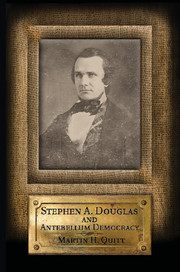'Martin H. Quitt’s sympathetic but unapologetic biography of Stephen A. Douglas departs from traditional studies of one of the dominant political figures of the antebellum era.'
Erik B. Alexander
Source: Journal of American History
'In terms of research, the book is marvelous; the author’s intensive labor in secondary sources is awe-inspiring, and he has found new primary sources concerning Douglas’s education, family, and marriage to Adele Cutts.'
James L. Huston
Source: Journal of the Early Republic
'Martin H. Quitt’s interpretation of Stephen A. Douglas is intriguing, and original.'
Graham A. Peck
Source: Journal of Illinois State Historical Society
'… demonstrates the enormous potential of political analysis interwoven with cultural and social history. … a fascinating study of the social, cultural, and psychological, as well as ideological origins of Douglas’s fervent belief in the right of (white) local majorities to control their own institutions - that is, in popular sovereignty. Employing manuscript collections, public records, local histories and political documents, Quitt argues that Douglas’ commitment to popular sovereignty predated and transcended his antebellum political and economic interests. … a nuanced analysis of a flawed statesman and the doctrine that defined his career.'
Source: Civil War History
'Quitt’s perceptive work on this psychologically complex and highly significant politician demonstrates that despite the Little Giant’s failings, we should continue to reckon with him.'
Matthew Norman
Source: Journal of Illinois History
'By situating Douglas’ political theories within his social milieu and psychological background, Quitt develops a nuanced analysis of a flawed statesman and the doctrine that defined his career.'
Michael E. Woods
Source: Civil War History





